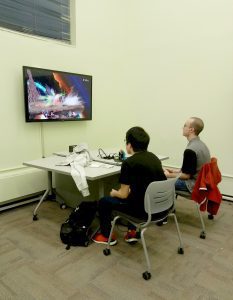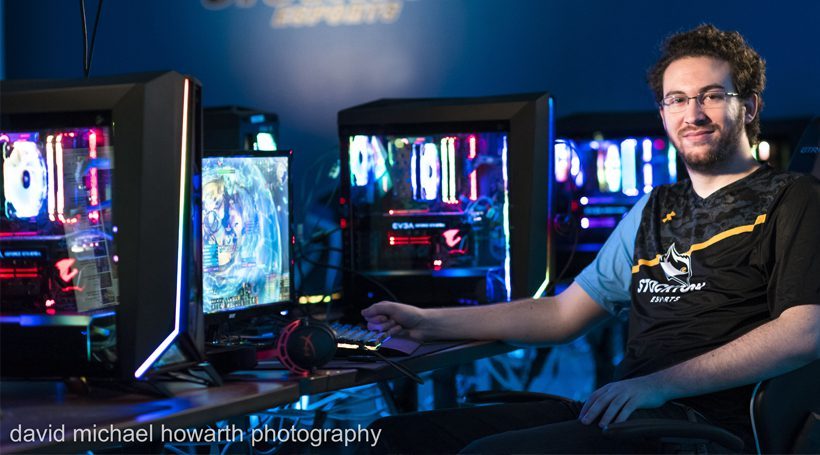 At 22, Jacob Hoppenfeld has already mastered an industry. And retired.
At 22, Jacob Hoppenfeld has already mastered an industry. And retired.
Like countless young gamers in South Jersey, Hoppenfeld was truly living the dream. He had conquered esports – electronic sports – from the comfort of his bedroom, perched in front of his computer during most of his waking hours. On one screen, he was in the fantasy universe of a game called World of Warcraft, engaging in valiant quests and fighting assorted monsters – and earning significant cash. On another screen, he’d be doing his homework and studying for exams. All throughout, he’d be on a voice/text chat with gaming-world friends from around the globe.
It worked, for the most part. Hoppenfeld was among the top-10 ranking players in the world, earning enough to pay for his junior and senior years at Stockton University. But recently, he realized, he had to let it go. The schedule during tournaments was tough enough: 10 hours a day, with breaks for stretching and meals. But other times of the year, his love for the game overrode trying to keep a reasonable schedule, and he’d end up playing for 18 hours straight.
So last year, at the ripe age of 21, he decided to walk away from competitive esports. Not that he was quitting esports altogether, but it was time to leave the high-echelon stuff behind.
“I have absolutely no regrets that I dropped it,” Hoppenfeld says. “There’s only so much time in the day, and playing at the top of your game takes a lot of time. So does getting a college degree. I’d rather get the degree than play at the top of the games. I also know I’m addicted to the game, so I needed to quit.”
Hoppenfeld is not your typical esports competitor in that, just as with football or baseball, he earned the real money by being the best of the best. But in other ways, he is emblematic of what’s going on in South Jersey and across the globe. He’s part of a trend that’s moved from the stereotype of the introverted kid playing in his basement to something that, if not mainstream, is awfully close.
Esports revenues worldwide are expected to hit $1.1 billion this year. Technology giant Intel has held talks with the International Olympic Committee about introducing esports to the games. ESPN The Magazine featured a gamer on its cover a year ago – the first time a gamer appeared on a major magazine cover. And just this past summer, a 16-year-old from Pennsylvania snagged a $3 million grand prize at the Fortnite World Cup.
It’s likely many people missed all that news, but this announcement in March was a huge wakeup call for South Jersey and the region: Comcast Spectacor is spending $50 million to build the first gaming arena in the United States right in the neighborhood of other beloved professional sports venues. The 3,500-seat arena will stand next to Xfinity Live! in the South Philly complex. It will house the Comcast Spectacor-owned Fusion, one of 20 international teams in the Overwatch League.
In South Jersey, Rutgers-Camden is one of the universities that has taken the growth of gaming seriously. It established its Digital Studies Center in 2013, combining arts, natural and social sciences, and digital studies. RUC Smash Club, a group of about 30 that plays Super Smash Bros., has built an on-campus community over the past two years, reaching out to recruit women and LGBTQ players as well.
At Rowan University, esports is also new but picking up momentum quickly. Members of the Rowan University Gaming Club participated last year for the first time in a tournament with other collegiate clubs from Rowan, Drexel and The College of New Jersey. So gaming is not so solitary a pursuit.
This social interaction in esports might surprise people, but Hoppenfeld says he hangs out with people from all over the United States, as well as from Sweden, Denmark, Israel and Turkey. He does so through a platform called Discord, which is an all-in-one voice and text chat for gamers. They use Discord – think Skype – to talk during games as well as breaks. He acknowledges the stereotype of a guy stuck in his basement isn’t all that farfetched. But…
“You have to be motivated to stay friends with people, to stay in touch with people,” he says. “That’s just how it works in life.”
Although gaming disorder is listed in the International Classification of Diseases used by physicians, esports are too new for a clear picture of its pros and cons, says Caroline Eggerding, MD, division head of pediatric neurology and development at the Children’s Regional Hospital at Cooper.
To her, anything in moderation is fine, but video gaming can be a double-edged sword, especially for kids with ADHD and autism. They tend to suffer social anxiety, and texting and video chatting during an activity of mutual interest can help. But they also need to practice reading social cues.
“My concern is they still need opportunities for face-to-face interaction, more than someone who doesn’t have that problem,” she says.
Organized esports is also extending its reach to younger gamers. PlayVS, an online gaming provider, is working with the National Federation of State High School Associations to introduce esports to high schools this fall. It will have an initial rollout in at least 15 states.
The New Jersey State Interscholastic Athletic Association has no official esports involvement yet but does get inquiries, says Executive Director Larry White. If a sizable number of schools wanted teams, the organization would look into it, he says.
For older adults, acceptance of esports is often a challenge. The game has so many differences compared to traditional sports, like it’s lack of a scoreboard or playing field.
In fact, the variety of games is enough to give pause to a newbie. League of Legends and Dota 2 are multiplayer online battle arena games, which involve more strategy and teamwork. Super Smash Bros. is a fighting game that is highly tactical. Overwatch is a first-person shooter game, meaning it’s more about quick reactions. Fortnite, which has ascended to dominance, is considered a battle royale, where competitors fight it out on a virtual island to see which individual or team will be the lone survivor.
For Hoppenfeld, having achieved legendary status makes him content to now play for fun without any individual glory.
With his addiction tamed, the psychology major is on target to graduate this spring and become an educator. He is on a successful League of Legends team and helps oversee the action at Stockton’s esports facility, which has 15 high-powered machines.
Having left the sport on top of his game, he has only respect for those who are taking the games to new levels.
“You play chess and call that a sport. Archery and sailing are sports,” he says. “If you play a game, I see no issues with calling it a sport.”














